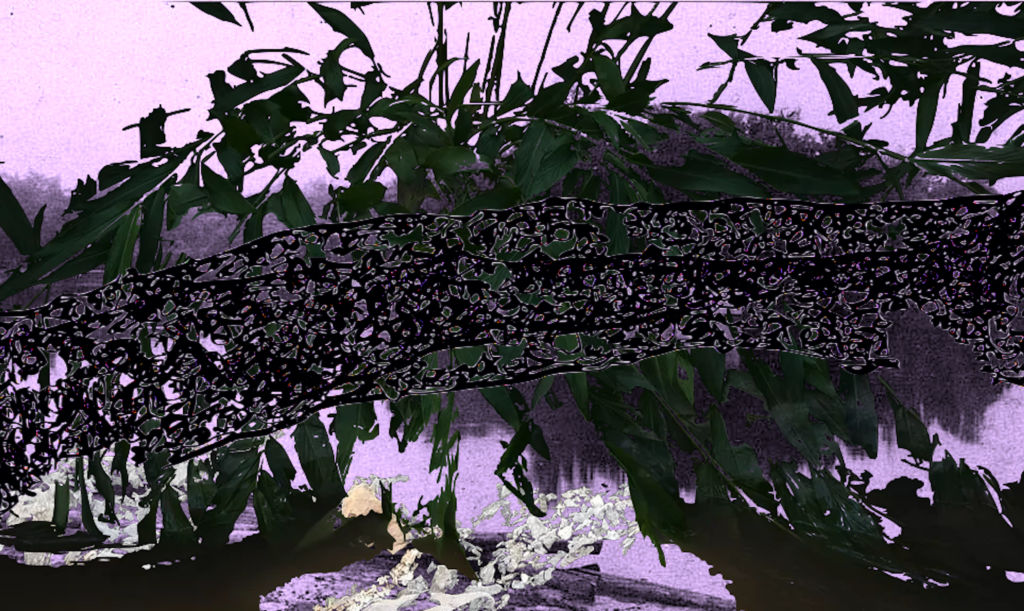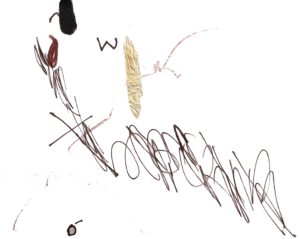


In Ways to listen to a river Nahuel Cano researches the history and meaning of rivers: the Limay and Salado in Argentina and the Vecht in the Netherlands. He translated the research into music and poems, to later build an audiovisual performance in collaboration with filmmaker Juan Fernández Gebauer and Ensemble Modelo62. Ways to listen to a river is a “performative concert”: It consists of live music, video projection, spoken word and actions on stage.
Following those rivers’ traits, in the piece the historical, the political and the ecological, but also the inner, intimate territories are threads that contribute to a particular form of storytelling. It not only involves what happened, the facts and data, but also the feelings, the dreams and potentialities together with silences and gaps: what we don’t know, what we cannot hear. Ways to listen to a river embraces ecological grief in an attempt to understand and exorcise it, for to listen to the whispers of a history of colonisation and violence from a present on the verge of collapse.
 Nahuel Cano was born in Neuquén, Argentina. Currently he lives and works in the Netherlands. He is an actor, theatre-maker, and sound experimenter. His field of artistic action is mobile, exploring the possibilities of performance, music, cinema, and theatre. In 2020 he graduated from the DAS Theater Master program in Amsterdam.
Nahuel Cano was born in Neuquén, Argentina. Currently he lives and works in the Netherlands. He is an actor, theatre-maker, and sound experimenter. His field of artistic action is mobile, exploring the possibilities of performance, music, cinema, and theatre. In 2020 he graduated from the DAS Theater Master program in Amsterdam.
As an actor, he worked both in cinema and theatre with important directors like Lucrecia Martel, Lotte van Der Berg, Diederik Van Rooijen, and Alejandro Tantanián, among others. From 2010 until 2017 as a maker Nahuel developed his artistic projects together with the group “El Cuarto” (www.estudioelcuarto.com). Nahuel is also a founding member of Escena Política (www.escenapolitica.org), an artistic collective that has organised actions, forums and performances advocating for more inclusive and fair practices in the art field in Buenos Aires.
Composer, performer Nahuel Cano
Film artist Juan Fernandez Gebauer
Ensemble Modelo62
Electronics Ezequiel Menalled
Cello Jan Willem Troost
Percussion Klára Andrlová
Bass clarinet Enric Sans I Morera
Soundmix Clare Gallagher
Eindregie advies Anouke de Groot
Vocal coach Claudia Cano
Composition advisor Ezequiel Menalled
Text advisor Flor Braier Kantor
Technical producer/stage manager Pablo Fontdevila
Color grading Vecht Maren Henke

website nahuelcano.me
instagram @nahuelcano2
facebook cano.nahuel
photo credits Elisabeth Melchior
part 2 · magic sells · Performing Arts Festival · Brussels · Bâtard 2023 ©
The show on the first evening (15th April) is a separatistic evening for people of the global majority/BIPOC. So please only book that evening if you identify with those terms. The show on the 16th of April is open for all. ---- We, Adam and Amina Seid Tahir, see how the terms BIPOC and people of color are less fortunate in their attempts of combating white supremacist andimperialistic ideologies, since they form in relation to whiteness (those ”not of color”) and therefore keeps whiteness as the norm. We rather use the term people of the global majority since we aren’t interested in identifying in relation to whiteness or white supremacy. ---- The term Global Majority was coined by Rosemary Campbell-Stephens. ”Global Majority refers to people who are Black, Asian, Brown, dual-heritage, indigenous to the global south, and or have been racialised as 'ethnic minorities’.” 1 This term was created for people of the global majority to not have to identify in relation to whiteness and to emphasize the fact that these groups make up the majority of the world’s population, specifically 80%. ---- The reason for choosing to use the term BIPOC despite this, is because we’re aware that the term people of the global majority hasn’t received as widespread attention yet. And since our main goal for this showing is to welcome our siblings from the global majority for a showing without the presence of a white colonial gaze, we choose to use the term that seems to be most commonly used in this festivals locality. ---- 1. Global Majority; Decolonising the language and Reframing the Conversation about Race” by Rosemary Campbell-Stephens, 2020